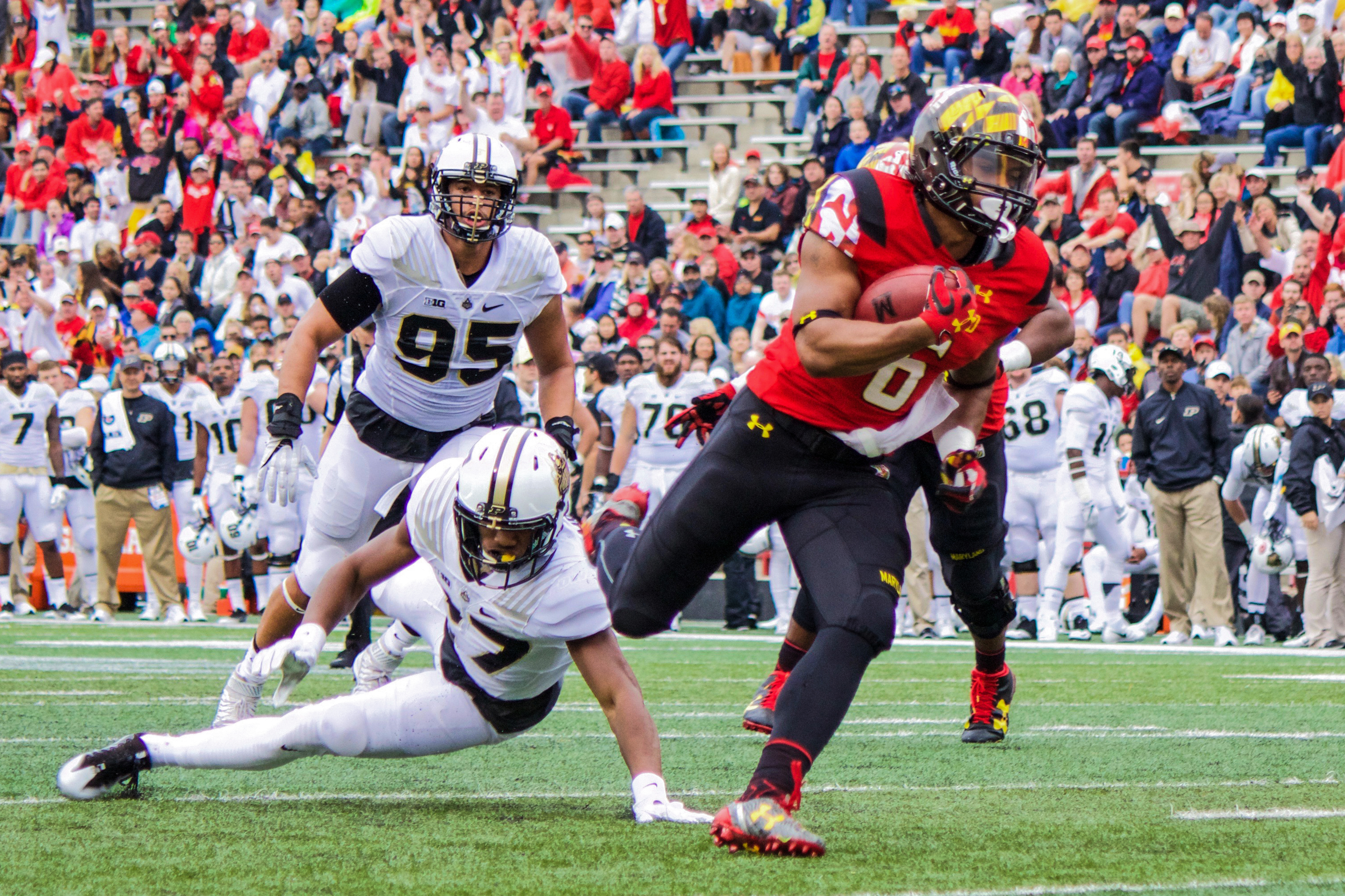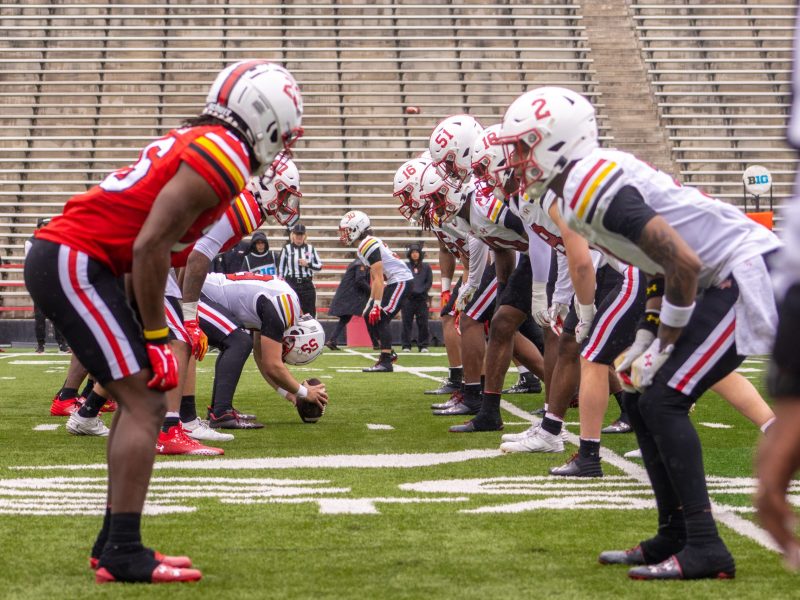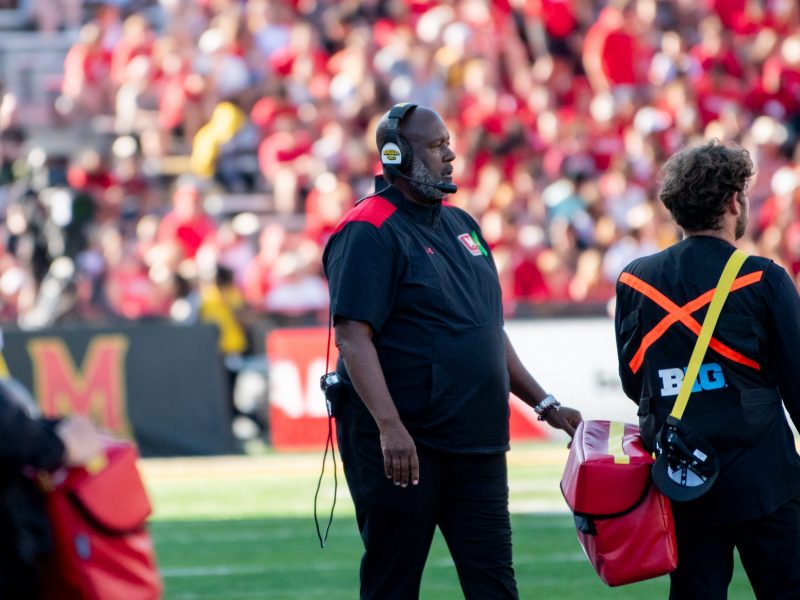The Maryland football team’s gameday roster card had some information missing at the bottom of its two-deep depth chart on Saturday. Cornerback Will Likely, the team’s top kick and punt returner, and his backups weren’t listed in the special teams section.
That’s because the team’s sports information directors didn’t have enough space. Coach DJ Durkin listed six running backs — three co-starters and three co-backups — in the breakdown.
The first-year leader insisted throughout the Terps’ nonconference slate he’d use a rotation of running backs to keep the players fresh and the opponents guessing. He didn’t buck the trend in Maryland’s 50-7 win over Purdue in its Big Ten opener.
At halftime, as the team jogged into the locker room with a 29-0 lead amid a roar from the announced 41,206 fans in the homecoming crowd, the Terps had logged 216 yards on the ground, though no ball carrier had more than six touches. By the time the team flooded the field for postgame handshakes, 10 Maryland players had contributed to the team’s 400 rushing yards.
“[Offensive coordinator Walt] Bell said our running backs [were] going to have to do this, and we’re like, ‘OK, bring it on,'” running back Ty Johnson said. “Being able to have that rotation and just keep going at it, keep going at it, it pays off.”
Johnson, who opened the season as the team’s lone starter in the backfield before Durkin began to experiment with expanding the lineups, paced the unit with seven carries for 204 yards and two touchdowns. The sophomore had three bursts of at least 48 yards.
After the game, Johnson said he couldn’t remember ever posting a 200-yard performance, even in his three-year varsity career at Fort Hill High School. The closest comparison to Saturday’s burst, the Cumberland native said, was last year’s season-ending win at Rutgers, when he recorded two carries — touchdowns from 43 and 44 yards out.
Johnson’s first score against the Boilermakers came about five minutes into the second quarter. Center Brendan Moore set a block on a Purdue defender, and Johnson scampered eight-yards into the end zone untouched to prop the Terps’ lead to 22-0.
As Johnson came off the field, running backs coach Anthony Tucker commended his back’s patience. In the spring, Tucker told him, Johnson wouldn’t have converted the play.
“I was like, ‘I saw it, Coach. I had to,'” Johnson said. “He’s been a great coach in teaching me how to be patient with my feet and accelerating when I need to.”
About six minutes later, Johnson displayed the composure while starting the team’s final drive of the half with a 56-yard jaunt. Since the summer entering his freshman year, Johnson said he’s gained about 30 pounds to combat the Big Ten’s physicality. The effort showed as he barreled through two Purdue defenders to position quarterback Perry Hills for a ground score.
After the break, Johnson poured on a 76-yard gain down the Terps sideline before a defender shoved him out of bounds at the five-yard line.
“I was a little winded — I’m not going to lie,” Johnson said. “I was a little surprised that I was.”
Each time the sophomore needed a break, though, the Terps turned to the slew of backfield options behind him.
Running back Lorenzo Harrison, the team’s leading rusher entering the contest, finished second Saturday with 76 yards on six touches. He became the program’s first rookie to record a rushing touchdown in each of the first four games when he darted 62 yards to give the Terps a 15-0 lead less than two minutes into the second quarter.
In total, seven players recorded at least three carries. The Terps turned to their reserves, including backup quarterback Tyrrell Pigrome, midway through the third period.
“The O-line did a heck of a job making the blocks, and the running backs, they make some great cuts,” said Hills, who finished with 18 net rushing yards, though he recorded a 30-yard third-down conversion to extend the Terps’ first scoring drive. “Sitting back there and seeing them split the defense, and then you get to run down the field with your arms up, it’s a great feeling.”
Durkin praised the group’s efforts, too. He said the depth in the backfield pushes each player, regardless of whether the coach listed him as a starter or reserve, to avoid complacency.
“Competition says 1,000 words,” Durkin said. “You can’t help but get better. Everybody improves each other, and I think that position, obviously, is probably the best competition we have right now.”



